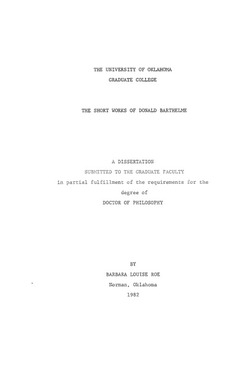| dc.contributor.author | Roe, Barbara L. | en_US |
| dc.date.accessioned | 2013-08-16T12:28:33Z | |
| dc.date.available | 2013-08-16T12:28:33Z | |
| dc.date.issued | 1982 | en_US |
| dc.identifier.uri | https://hdl.handle.net/11244/4984 | |
| dc.description.abstract | It would seem most useful to read Barthelme's literature as both comment on and instance of the generic evolution in fiction during the past two decades. Reading the non-fiction parodies first enables us to recognize and reject outmoded conventions cast off by writers during the 1960's. Since the parodies depend upon the familiarity of their content for success, they clearly move the reader through generic transition from the "literature of exhaustion" to "literary disruptions." With a knowledge of the social and artistic backdrop that prompted fictionists to explore new literary structures, the reader is then prepared to see how linear plot is displaced by a spatially designed text, how character is displaced by a grammatical presence without a history, and how narrative viewpoint is fragmented through the prismatic structures of a collage format. Finally, an understanding of the inventive structures of Barthelme's texts becomes the foundation for discovering how aural and visual associations play across the spaces of the intermedia compositions, arranged in increasing complexity of their designs. | en_US |
| dc.description.abstract | Guided by this systematic approach, as well as by authorial comments in books, essays, interviews, and sound recordings, Barthelme's audience may easily adapt to its new role as reader/critic, whether it is playing within the shifting perimeters of Barthelme's works or the broader scope of contemporary fiction. | en_US |
| dc.description.abstract | Since the early 1970's, Donald Barthelme has been acknowledged as a forerunner among a maverick breed of "disruptive" American writers, whose innovative techniques have renewed the life of fiction. However, critical response to this renaissance has been somewhat misleading. Heralded by its enthusiasts upon the so-called death of the novel, the advent of "new fiction" gives the impression that the shift from "literature of exhaustion" to "literary disruptions" occurred abruptly. Moreover, critics, either unable or unwilling to discuss variety in technique, have attempted to embrace all disruptive works as "experimental" fiction or as offshoots of an emerging subgenre. Such hypotheses, taken without the previous decade's literary backdrop, somewhat distort the evolution of fiction as a whole and, more particularly, the processes of construction among Barthelme's short works--non-fiction parodies, inventive fictions, and intermedia compositions. | en_US |
| dc.format.extent | vi, 198 leaves : | en_US |
| dc.subject | Literature, American. | en_US |
| dc.title | The short works of Donald Barthelme. | en_US |
| dc.type | Thesis | en_US |
| dc.thesis.degree | Ph.D. | en_US |
| dc.thesis.degreeDiscipline | Jeannine Rainbolt College of Education | en_US |
| dc.note | Source: Dissertation Abstracts International, Volume: 43-02, Section: A, page: 0447. | en_US |
| ou.identifier | (UMI)AAI8215918 | en_US |
| ou.group | Jeannine Rainbolt College of Education | |
